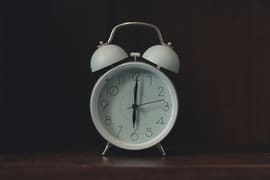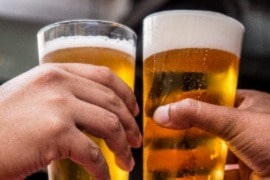Just like individuals who suffer from depression or bipolar disorder, alcoholism has to do with a chemical imbalance in the brain. In short, this is why some people become dependent upon alcohol and why removing it from the body can be a long battle.
People who drink moderately may be able to say no to alcohol. They may go days, weeks or years between having a drink. However, someone who struggles with drinking is often unable to act the same way. Instead, they may drink compulsively on a daily basis. When someone is addicted to alcohol, drinking becomes a big part of their life, even if they want to stop. This can lead some people to wonder why people who are susceptible to addiction drink.
Related Topic: Am I an alcoholic
A Chemical Imbalance
The neurotransmitters, or brain chemicals, of people who struggle with drinking can differ from other people. Studies have shown that drinking causes a change in the way certain important brain chemicals function. Drinking can cause these chemicals to become imbalanced. In particular, drinking affects:
- Gamma-aminobutyric acid, or GABA: Drinking depresses the central nervous system by increasing the levels of this chemical.
- Glutamate: Drinking suppresses the levels of this chemical, which revs up the central nervous system under normal circumstances. In turn, the central nervous system is further depressed.
- Dopamine: This chemical, part of the brain’s reward system, is triggered by drinking, leading to a feel-good state and desire to keep drinking.
- Serotonin: Drinking increases the level of this chemical, which is linked to a sense of well-being and a good mood.
Over time, the brain becomes used to these chemical imbalances. In turn, a person needs to drink larger amounts more frequently to reach the same state of relaxation and well-being that they once did. As the brain continues to adapt to alcohol, when a person is not drinking, they can start to go through unpleasant symptoms of withdrawal because their brain chemistry has changed.
Alcohol Changes the Brain
Besides changing the levels of brain chemicals, over time, drinking can change the brain itself. The brain then responds differently to the outside world than it normally would. Parts of the brain known to change from long-term drinking include:
- Prefrontal–striatal–limbic circuit: This part of the brain controls emotions, decision-making and stress and can be harmed in long-term drinking.
- Ventral striatum: The feel-good brain chemical dopamine stops working as well in this area of the brain.
- Prefrontal cortex and orbitofrontal cortex: People who struggle with drinking have less gray matter, or brain cells, than normal in this part of the brain responsible for decision-making.
Relapsing
Even when people who struggle with drinking try to stop, having setbacks, or relapses, is common. Without help, it is often easy for many people to go back to the same lifestyle and drinking patterns they had before quitting. The long-term brain changes and chemical imbalances from drinking raise the risk of relapse without help.
We surveyed 2,136 American adults who either wanted to stop drinking alcohol or had already tried to (successfully or not). We asked them about their alcohol use, reasons for drinking, alcohol-related outcomes, health and more.
For the study, relapse was defined as a return to old alcohol abuse behaviors. Of those surveyed, only 29.4% reported not relapsing at all. The largest group (32.3%) relapsed back to alcohol use within the first year after stopping. With perseverance, your chances of relapsing decrease the longer you stay sober: 21.4% relapsed in their second year in recovery, but only 9.6% relapsed in years three through five, and only 7.2% did so after their fifth year in recovery.
For this reason, intervention and aftercare are important for those struggling to recover from alcohol addiction. Establishing a foundation in recovery is key to avoiding setbacks.
Articles Related to Alcoholism

Alcohol detox isn’t easy and not everyone can do it on their own. That is why alcohol detox and alcohol withdrawal treatment is administered by medical professionals.

Alcoholism takes many forms, and the stereotype doesn’t always hold true. So when do a few drinks with friends become a full-blown alcohol addiction? How do you know if you are an alcoholic?

While cirrhosis scars from excessive drinking are irreversible, quitting alcohol and leading a healthier lifestyle can help your liver heal from alcohol-related liver disease.

When detoxing, hydration is key. However, certain food groups also have benefits when it comes to helping with the discomfort of withdrawal symptoms and detoxification.

Detox from alcohol can begin within hours. Typically, alcohol withdrawal symptoms happen for heavier drinkers. Alcohol withdrawal can begin within hours of ending a drinking session.

Daily drinking can have serious consequences for a person’s health, both in the short- and long-term. Many of the effects of drinking every day can be reversed through early intervention.


Costardi, João Victor; et al. “A review on alcohol: from the central ac[…] chemical dependency.” Revista da Associacao Medica Brasileira, 2015. Accessed December 29, 2019.
Seo, Dongju. “Neuroplasticity and Predictors of Alcohol Recovery.” Alcohol Research Current Reviews, 2015. Accessed December 29, 2019.
The Recovery Village aims to improve the quality of life for people struggling with substance use or mental health disorder with fact-based content about the nature of behavioral health conditions, treatment options and their related outcomes. We publish material that is researched, cited, edited and reviewed by licensed medical professionals. The information we provide is not intended to be a substitute for professional medical advice, diagnosis or treatment. It should not be used in place of the advice of your physician or other qualified healthcare providers.